Puppy Care 101: Information Sheet for a Healthy Pup

Updated on
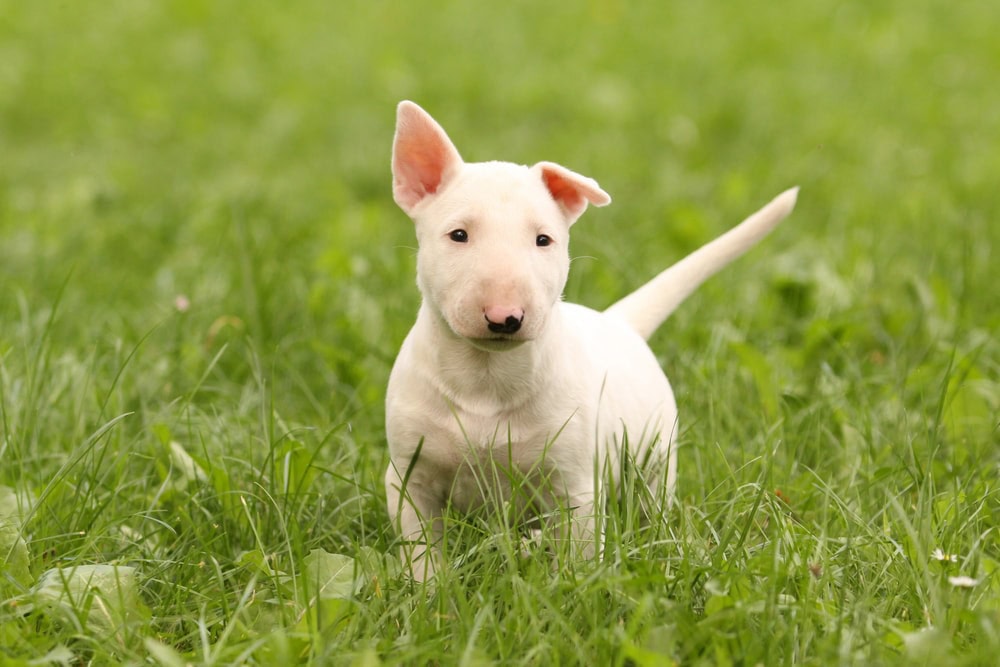
Getting a puppy is exciting and nerve-wracking at the same time. Raising a dog is a rewarding experience, but first-time puppy owners could easily become overwhelmed by all the responsibilities. Puppies need lots of care and attention, and it is critical to instill good habits from the beginning. Making sure your house is puppy-proof, getting the right food, and sticking to a rigid training schedule are all daunting tasks. Don’t forget, there are also monetary costs, potty training, and a million other important aspects of raising a puppy.
If you’re starting to feel overwhelmed, don’t worry; we’ve got your back. We put together this guide to help you focus on what’s important: cherishing those precious months of puppyhood and creating a safe and happy environment for your newest—and cutest—family member. We have a lot to cover, so let’s get started.
Do Puppies Make Good Pets?
Before we get into the details, we should first address the elephant in the room: do puppies make good pets? Some people might be surprised to hear that our answer is no. We love dogs, and we think they make excellent pets, but puppies require a tremendous amount of work, and most people would probably not get a puppy if they never grew out of some behaviors.
Puppies are notorious for getting into trouble as they explore the world around them, experiencing virtually everything for the first time. New puppy owners need to make sure that their homes are prepared for their puppy’s curious nose and teeth, which will find their way into everything. It can be exhausting to constantly follow your puppy around, making sure they don’t injure themselves or damage anything.
Another reason puppies don’t make great pets is because they are still learning how to behave and interact with other dogs and people. Puppies chew on everything and don’t understand that their needle-like teeth hurt. Interacting and playing with your new puppy is important but comes with many chomps and scratches. Teaching your puppy not to bite is essential for raising a dog that eventually becomes the model example of a great pet.
One final note is that we understand that it might seem strange to separate puppies from dogs when talking about whether they make good pets, but we think this distinction is important. Many people get a puppy only to realize they were not prepared for the amount of time and effort required to raise a puppy. If you expect a new puppy to be the perfect pet from day one, you’re setting yourself up for disappointment. It’s unfair to the puppy to place unreasonable expectations on them, so we think recognizing that puppies don’t make good pets is important.

Where Can I Get a Puppy?
With those disclaimers out of the way, if you decide you want to get a puppy, where should you get one? The best place to get a puppy is from a shelter or dog rescue. An alarming number of people get puppies before thinking through what it takes financially and emotionally to raise a puppy. The sad reality is many people dive headlong into puppy parenthood without being adequately prepared.
Shelters are routinely overfilled, and finding room for new dogs in need isn’t always possible. When you rescue a puppy from a shelter, you’re saving their lives and opening a place for another dog that needs a place to stay. Puppies can be difficult to find in some shelters because they are usually in high demand. Many dog owners prefer raising a dog from a puppy, and therefore puppies in shelters tend to be adopted quickly.
If you can’t rescue a puppy, the other option you have is to purchase one from a reputable breeder. Finding a breeder can be a challenge, but asking a local vet for recommendations is usually a good start. Some organizations, like the American Kennel Club, also have a vetting process that helps verify responsible breeders. Be prepared to travel up to several hours from your home, depending on where you live.
Once you have a shortlist of breeders, make sure you call each one and ask any questions you have. If possible, a visit to the breeder before you commit to buying a dog from them is a great idea. You should always trust your gut. If something feels off about the breeder or the premises, don’t use them. It’s always best to trust your instincts when it comes to judging character. If something doesn’t seem right, often, there’s a good reason.
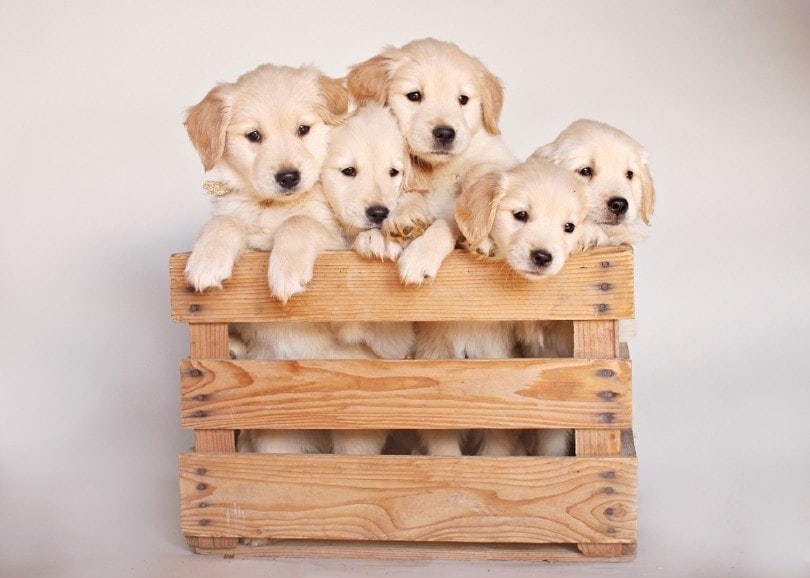
What Are the Upfront Costs of Owning a Puppy?
Before your fuzzy little tike ever puts a paw inside your house, there are some things you need to have ready. Most importantly, make sure you have a spot set up just for the puppy. Crate training is an excellent option and gives your puppy a safe space where they can feel comfortable and relax. If you decide to crate train your new puppy, make sure to purchase a crate that will accommodate them when they’re fully grown, as they will continue using it as a safe place to go even when they’re older.
A dog bed is another essential item to have before you bring your fuzzy bundle of joy home. Puppies can sleep anywhere when they’re tired enough, but a nice soft bed they can nestle into is the best option for keeping them comfortable and safe.
Other upfront costs include toys, coverage for spaying/neutering, an initial vet examination with shots, and adoption fees from a shelter or the breeder fee. All told, the upfront cost of owning a puppy can easily reach $2,000 and can be significantly more if you get your puppy from a breeder. This total doesn’t include the recurring costs of food, grooming, or vet visits throughout a dog’s life, so keep that in mind when calculating your budget.
There are many important pet supplies to stock up on, but one that many people forget is pet insurance. Companies like Lemonade offer balanced, personalized plans that can help you keep vet costs under control.
What Kind of Home Does My Puppy Need?
You need to do a few things before you bring your puppy home to ensure your puppy has a safe environment to grow up in. Make sure that any items that might attract a curious puppy’s attention are out of reach. Remove any decorations or knick knacks from end tables, and don’t leave any miscellaneous items on the floor. You might have to make considerable changes to your storage habits depending on how you organize your home.
Wires and plugs are another danger for a new puppy, so make sure to secure any wires and keep them out of harm’s way if possible. Some wires won’t be able to be removed. We recommend coating those with a deterrent spray to prevent your puppy from chewing them.
Toys are essential for a puppy’s development, so make sure you have a few ready to go when they come home. A ball, rope toy, and something safe to chew like a rubber Kong are all a new puppy really needs to have a rich and engaging playtime. Variety is good, but be careful not to overload your puppy with too many choices. Puppies don’t have long attention spans, and they can become overwhelmed if you present them with too many toys from the start.
Otherwise, the rest of the stuff you need is pretty basic. Any new puppy owner should have brushes, pee pads for potty training, safe things to chew like bully sticks, plenty of paper towels, and household cleaners to mop up the occasional accident. Anything else that you find you need can be purchased as you go.
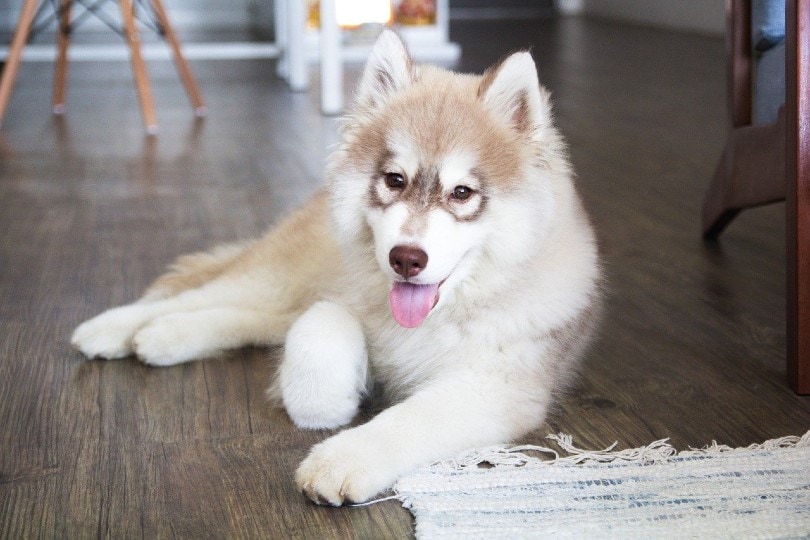
What Should I Feed My Puppy?
Feeding a puppy enough to ensure they have the nutrients they need to grow but not so much that they become obese can be a tricky balancing act. The best way to plan your puppy’s diet is with the help of a veterinarian or veterinarian nutritionist. They can help you choose dog food that meets your puppy’s specific nutritional needs since every dog is different. Different breeds and different sized dogs have different dietary requirements, so the best option is to consult a professional.
Some vets recommend starting a puppy on wet food and slowly transitioning to kibble as they get older. Your vet will know what strategy will work best for your puppy. Some dog owners prefer feeding their dog homemade dog food, and while that can be a good option for older dogs, most vets don’t recommend feeding a puppy a homemade diet. Getting the right nutritional balance is difficult, and your puppy’s health depends on getting proper nutrition as they grow.
Puppy Care Information Sheet (The 4 Things to Watch)
1. Puppy Feeding
Most puppies eat on a regular schedule and have two meals per day. Your veterinarian will be able to advise you about the best feeding schedule for your dog. Some dogs, even puppies, won’t eat until they burst, so you may be able to fill their bowl once in the morning and leave it out for them for the entire day. If your vet recommends this method, make sure to clean their bowl regularly to prevent any build-up of dirt and grime.
2. Puppy Socializing
One of the most important things you must do for your puppy is socialize them. Dogs need to learn boundaries as they grow up, and the only way for them to learn how to interact with other dogs and people is by practicing. Dogs that aren’t socialized as puppies can develop behavioral disorders and are more prone to anxiety, aggression, and neurotic behavior.
The only caveat to socializing your puppy with other dogs is to make sure you only introduce the puppy to dogs who have their shots. Puppies can’t be vaccinated until they’re old enough, but they need socialization immediately. The best option is to ask family and friends you trust to arrange a playdate. It is generally safe for a new puppy to be around vaccinated dogs, but consult your vet for more specific information.
Socializing with people is equally important and generally not too difficult. We don’t know too many people that would turn down an opportunity to spend some time with a new puppy, so don’t be afraid to ask your friends and family to come over and play with the puppy. We’re willing to bet they’ll be thrilled.
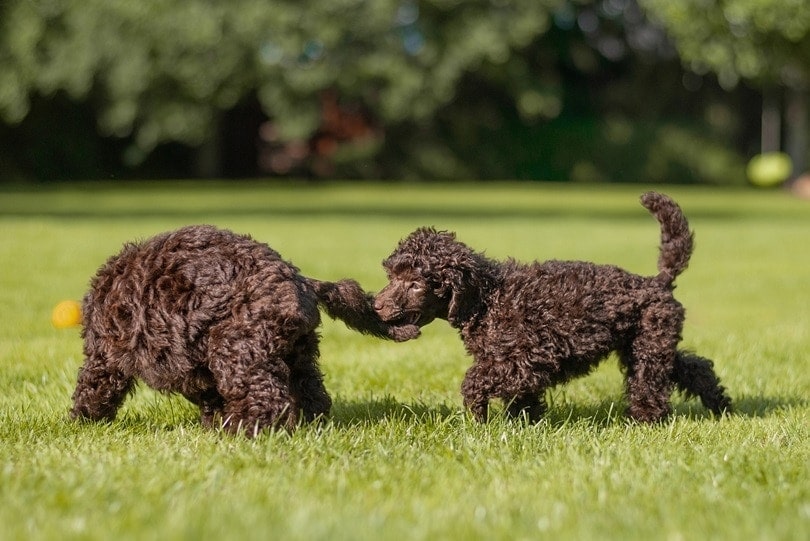
3. Puppy Training
Puppies need regular training to engage their minds and form strong bonds with their owners. Some simple obedience training can go a long way to instilling good communication between you and your dog for its entire life. Commands like sit, stay, and down are great for teaching them control and also helpful in calming them down when they get a case of puppy zoomies. Other commands like leave it and drop it are essential since they can save your dog’s life if they get something dangerous.
Positive reinforcement training is surprisingly easy once you get the hang of it. Make sure you have lots of treats on hand to train with. If you do a lot of training with a lot of treats, make sure you cut down their regular food slightly, so you don’t accidentally overfeed them.
4. Puppy At The Vet
You should schedule an appointment with your vet as soon as you get your puppy. A vet will examine your puppy to make sure they’re in good health, schedule shots for when they’re old enough, and be able to ask any questions you may have about being a new puppy parent.
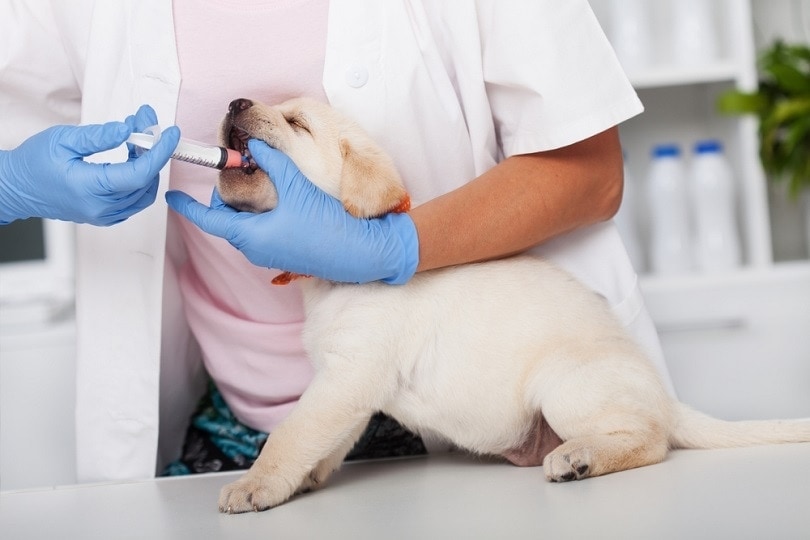
How Do I Know If My Puppy Is Sick? (3 Common Sicknesses)
And speaking of the vet, sometimes even puppies might come down with something, so it’s important to be able to recognize the signs of common puppy illnesses.
1. Canine Distemper Virus (CDV)
You must get your puppy vaccinated against canine distemper virus as soon as your vet says they’re ready. CDV symptoms can mimic a regular cold, and your puppy may cough and sneeze and have runny eyes. It is important not to ignore these symptoms since they can be the precursor to much more severe symptoms like seizures and other neurological problems.
Luckily, most puppies get vaccinated before they have a chance to contract CDV, but any new puppy owner should know the signs so they can get their dog veterinary attention immediately.
2. Parvovirus
Another common puppy ailment is parvovirus or parvo, for short. Just like CDV, parvo is prevented by vaccination, and it is imperative to get your dog vaccinated against parvo as soon as they are eligible for the shots.
Symptoms of parvo include fever, vomiting, and diarrhea. Parvo is an extremely contagious canine disease, so make sure to take your dog to the vet if you know they were exposed to another dog with parvo, even if they aren’t exhibiting symptoms themselves.
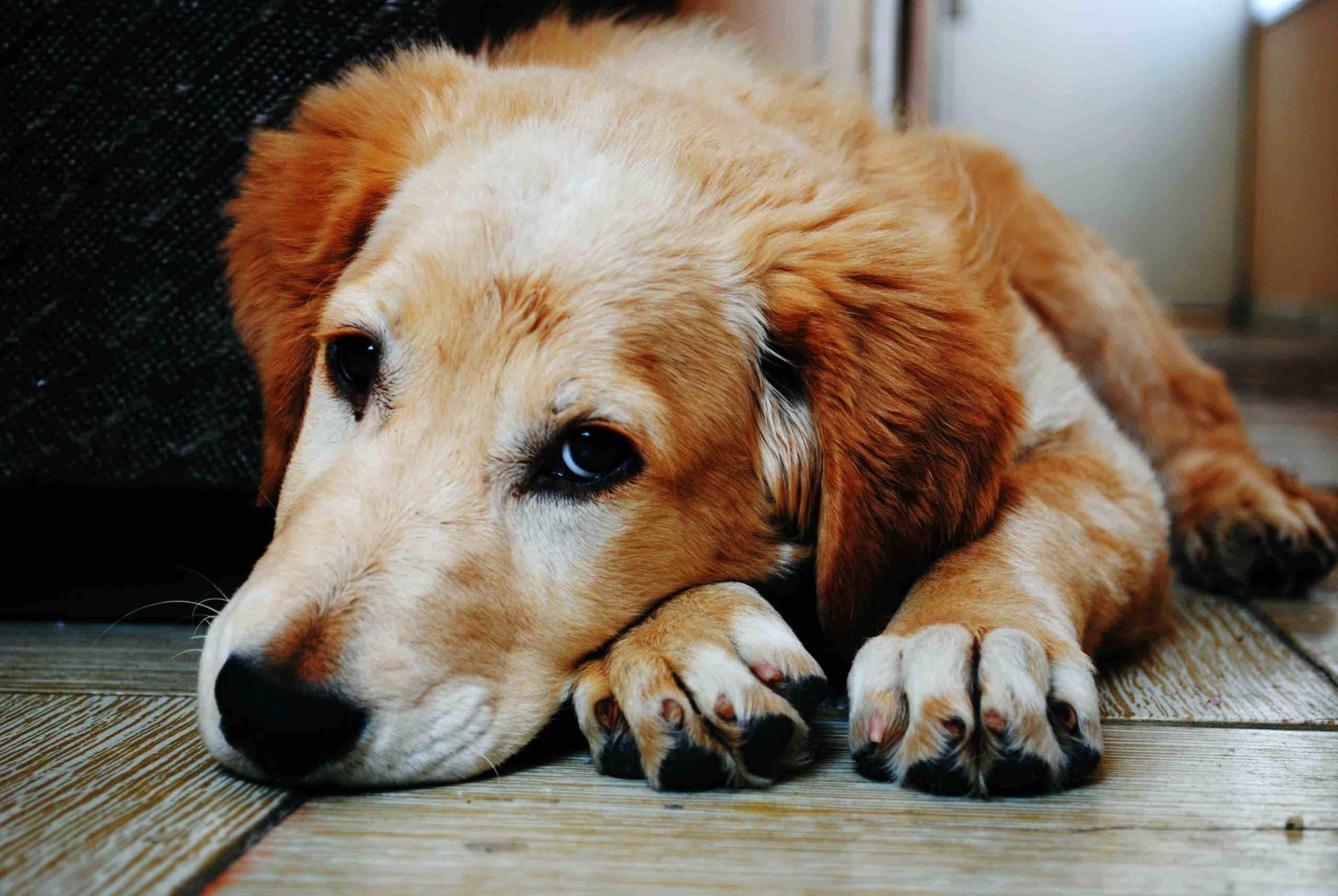
3. Kennel Cough
With parvo and CDV out of the way, the third illness to watch out for is kennel cough. Thankfully, unlike parvo and CDV, kennel cough is not dangerous and easily treatable. If your dog develops a dry cough, sneezing, and seems lackadaisical, kennel cough is the primary suspect.
Most cases of kennel cough pass without the need for veterinary intervention, but in more severe cases, your vet may prescribe an antibiotic to help your dog recover.
Other than acute illnesses, you should visit the vet several times in your puppy’s first few months at home. They’ll need their initial examination, appointments for shots, and spaying or neutering. After they get a bit older, a yearly visit to the vet is a good idea.
Conclusion
We hope this guide has helped ease some worry about getting a new puppy and armed you with the knowledge you need to raise a healthy, happy pup! Getting a puppy is a big decision and not one to take lightly. There are significant financial, emotional, and physical (puppy teeth are sharp!) costs associated with getting a new puppy, but, in the end, it’s more than worth it.
Featured Image Credit: Elisabeth Hammerschmid, Shutterstock













